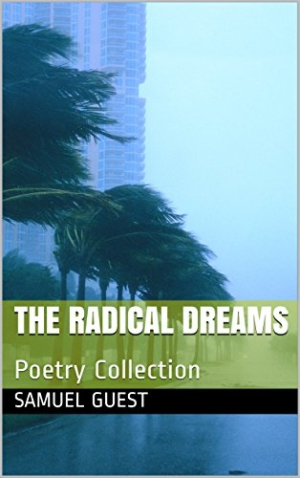
The Radical Dreams
Poetry Collection
The poems in The Radical Dreams are resonant, colored by emotional turbulence and finding solace in relationships and the natural world.
In his collection The Radical Dreams, poet Samuel Guest offers striking images and an interesting juxtaposition of voices.
Guest uses a range of poetic techniques to explore anxiety, relationships, and the natural world. His slim volume is divided into three sections, titled “Shards of Truth,” “Portal to the Soul,” and “Love and What Comes Easier.” Each section begins with a brief statement that explains Guest’s state of mind when he was composing the poems. For example, part 1 begins with the following: “There was an honesty to my darkest thoughts and nightmares. I knew where I was headed, so I made a change for the better.” These statements are helpful for contextualizing the poems and illuminating the collection’s tonal progression.
“Shards of Truth,” the opening section, is filled with poems tackling dark emotions. From the suicidal thoughts in the stream-of-consciousness prose poem “C-O-H-E-R-E-N-C-E” to the frantic anxiety of “Plight,” Guest paints a picture of mental upheaval. Through this lens, even the earth itself is damaged and in need of protection: “Expel the death somewhere,” Guest implores, “high in space where the / killing fiber will be / too far out to afflict / the planet that holds us.”
In the middle section, “Portal to the Soul,” the poems lighten significantly. Brooding images of death give way to lines that marvel at nature. In “Snowflakes, December 12th, 2017,” for example, Guest notes the “soundless spell” a snowstorm casts over him. This stands in notable contrast to “Winter’s Tempest” in the first section, where snow forces people to barricade their windows and “surge[s] forward at a mordant pace.”
“Love and What Comes Easier,” the final section, finds Guest basking in relationship bliss, to a certain extent. While there is some pain and longing for the past, as in “Pin Prick” and “The Dust of Love,” there’s also unabashed affection and delight to be found. In “Smiles Like That,” Guest writes, “Your smile speaks to me …. Breeds everlasting youth on everyone it touches.” “Dreams Becoming Real” is even more explicit about the happiness of new love: “When we met the joy had begun / The past laid to rest / Me at my best.” The collection finishes with the loving and simple “What’s Perfect,” a fitting conclusion to the book’s emotional arc.
There are several registers at work in the collection, ranging from the highly formal (“Were it not for the hell-bent phantom …”) to the resolutely casual (“I saw a woman smooch / A man this morning”). Many of these inconsistencies of voice give a pleasing thrill of cognitive dissonance.
But occasionally the voices are distinct enough that they don’t quite mesh, such as “Outmuscled the sucker in a flash / Thump on the skull” immediately followed by “His fate I must annul.” There’s also a reliance on flashy words that occasionally muddies Guest’s larger points.
Guest’s poems are at their best when they make surprising connections in a straightforward manner. Lines like “My house is prime real estate for car accidents” and “The promises that we made to each other outpace me by two feet” resonate deeply in large part because they marry seemingly incompatible images (like houses and car accidents) in a subversively simple way.
The poems in The Radical Dreams are resonant, colored by emotional turbulence and finding solace in relationships and the natural world.
Reviewed by
Anitra Budd
Disclosure: This article is not an endorsement, but a review. The publisher of this book provided free copies of the book and paid a small fee to have their book reviewed by a professional reviewer. Foreword Reviews and Clarion Reviews make no guarantee that the publisher will receive a positive review. Foreword Magazine, Inc. is disclosing this in accordance with the Federal Trade Commission’s 16 CFR, Part 255.
